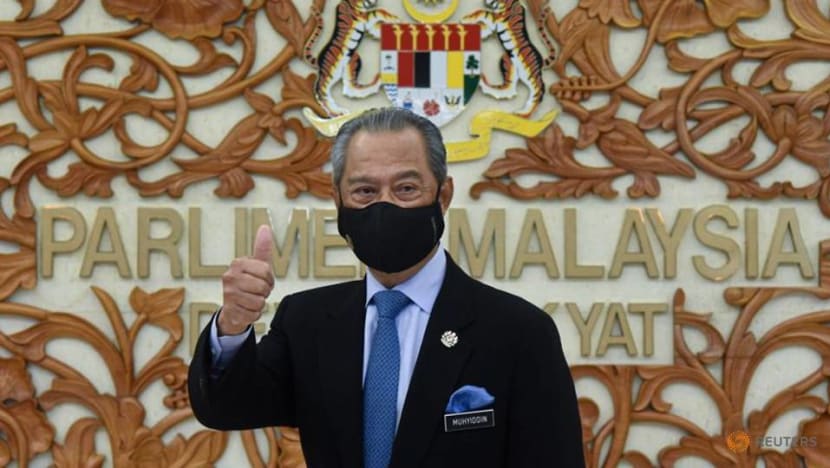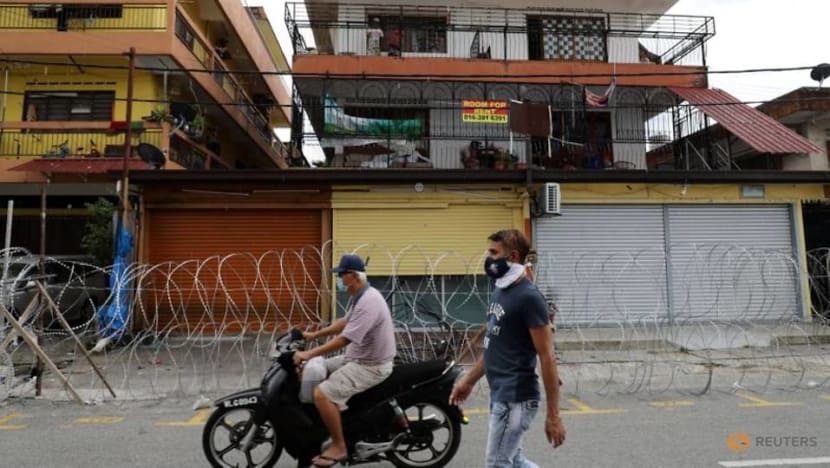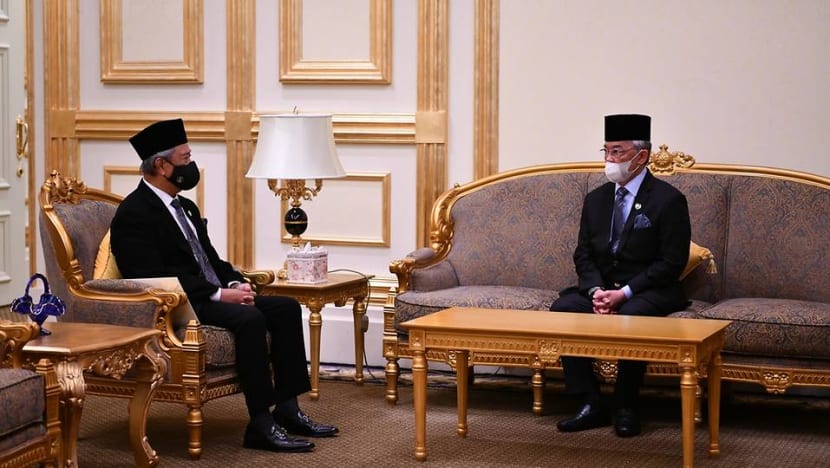commentary Commentary
Commentary: A convenient state of emergency amid challenging times in Malaysia
Malaysians have expressed concerns over the declaration of a state of emergency. The political implications are grave, says Oh Ei Sun.

Malaysia's Prime Minister Muhyiddin Yassin poses for a picture at the parliament, in Kuala Lumpur, Malaysia on Nov 26, 2020. (Photo: Reuters/Malaysia Information Department/Zarith Zulkifli/Handout)
SINGAPORE: Many Malaysians were caught off guard on Tuesday (Jan 12) morning as they commenced yet another work day.
The Palace released a press statement, in which the Malaysian king proclaimed a state of emergency in the federation until early August, more than half a year from now.
This was followed shortly by a television address – a second one in less than 24 hours – by Prime Minister Muhyiddin Yassin, who explained his Cabinet had advised the king to make the declaration to provide his government with powers to curb the coronavirus pandemic more effectively.
Indeed, after having improved significantly in the second half of last year, the pandemic situation in Malaysia has taken a turn for the worse over the last month, with daily new infection cases hovering around the 2,000 to 3,000 range, with scarcely any sign of lowering.
READ: What you need to know about the state of emergency and tightening COVID-19 curbs in Malaysia
AMBIVALENCE TURNED INTO RELIEF
The public was at first somewhat ambivalent over whether another round of the Movement Control Order (MCO), which had been effective in subduing the first wave of infections earlier last year, was again needed.
After all, the MCO, with its mandatory cessation of many economic activities, had been detrimental for businesses and livelihoods.
Opinions were thus initially divided as to whether the continuingly depressed economy could withstand yet another round of the restrictive MCO.
But in recent weeks, as more Malaysians saw their close friends and loved ones get infected, a consensus that some restrictions were indeed needed to suppress the pandemic gradually formed.

So when Muhyiddin announced on late Monday afternoon another round of the MCO, many breathed a sigh of relief, as rumours of the MCO being reinstated were finally settled. The certainty was welcome.
This time, the MCO was even calibrated to the severity of the situation in specific states and territories.
In hard-hit Kuala Lumpur, Selangor and Penang, major economic centres, the most restrictive form of the MCO would be imposed.
Yet residents took it more or less in their stride. They understood the prioritisation of the preservation of life over the restoration of livelihood for now.
READ: Commentary: What struggling Malaysians need from this Budget is a stronger safety net – and higher taxes
RELIEF TURNED INTO CONCERN
But a similar understanding did not extend to the announcement of a state of emergency the next morning. Online and aloud, the public wondered about the necessity of such a drastic move.
The king had rejected the notion just over two months ago and Malaysia managed to flatten the curve after.
READ: Commentary: Malaysian king steers a country through rough waters
Muhyddin explained that, for example, the king could proclaim ordinances, enabling governmental commandeering of private medical facilities and other non-public resources to combat the pandemic.
But these and other similarly ambiguous examples provided by Muhyiddin did not quite persuade the general public.
After all, the government could simply utilise existing laws, including the comprehensive Prevention and Control of Infectious Diseases Act 1988, to accomplish these same ends.

Besides, if existing laws and regulations prove inadequate to effectively combat the pandemic, the government could also amend relevant laws or enact new ones in parliament.
It would be hard to imagine opposition members of parliament (MPs), even those from the increasingly antagonistic UMNO within the ruling coalition, opposing such amendments. They would be seen as obstructing the national pandemic effort.
Moreover, the Malaysian constitution provides that only if a “grave emergency exists whereby the security, or economic life, or public” is threatened, an emergency may be proclaimed.
But Malaysia is not facing an external or internal security threat; nor are members of the public taking to the streets, however dissatisfied they may be with the handling of the pandemic.
There is no denying that the Malaysian economy is wallowing in the doldrums, but it was in a much worse shape during the 1998 Asian Financial Crisis, which notably did not see an emergency proclamation.
So why is there an urge to hasten an emergency proclamation in Malaysia, the first for the country for more than half a century?
Listen to Malaysians coping with a new wave of COVID-19 share their very different experiences of living through the pandemic in Johor, Kuala Lumpur and Sabah:
CONCERNS OVER EXPANDED POWERS
Muhyiddin took an expanded interpretation of “grave emergency” to encompass the pandemic and its economic consequences.
The emergency was called in the king’s name, but, the king is advised by the government of the day, and Muhyiddin shoulders the ultimate political responsibility for the proclamation.
Keen observation of recent Malaysian politics would point to Muhyiddin’s real motive.
Doing so would allow him to launch a preemptive strike against his increasingly hostile coalition partner party, UMNO, which frequently flirts with the opposition and stirs rumours of supporting Anwar Ibrahim for prime minister to undermine the Muhyiddin government.
READ: Commentary: UMNO’s fear that Bersatu could destroy it does have some basis
READ: Commentary: UMNO’s in no shape to play kingmaker in Malaysia
Given UMNO’s recent threats to sever ties with Bersatu, they could conceivably ally with other groups to defect and cut Muhyiddin off.
If a government loses the support of the parliamentary majority, then in accordance with Malaysia’s parliamentary conventions, Muhyiddin would have to quit. His government barely commands a majority as it stands.
But during a state of emergency, the Constitution is silent on whether a government deprived of a parliamentary majority must resign.
Indeed, hours after the emergency proclamation, another UMNO MP withdrew support for the Muhyiddin government. But Muhyiddin did not seem perturbed.
He knows Bersatu can breathe easy. For the next eight months, parliament and state legislatures are suspended. Both executive and legislative powers are consolidated into his government’s hands.
Despite Muhyiddin having publicly promised to not interfere with the judiciary, constitutionally, it is fuzzy whether ordinances issued during this period can be challenged in the courts.
Although parliament could revoke these ordinances once it reconvenes, in principle, the emergency could be prolonged indefinitely.
Muhyiddin has effectively requested for unconditional public trust of his intentions to serve the national interest. Under this state of emergency, Malaysia has now been left with few checks and balances against potential abuses.

Moreover, his expanded definition of emergency sets a less than positive political precedent for future governments of Malaysia who might capitalise on opportune disasters to hold onto power.
The government of the day could also take a broader interpretation of actions deemed to be destablising and impose sanctions, as Muhyiddin’s speech hinted.
BUSINESSES AND WORKERS WILL NOT BE AFFECTED
Fortunately, the proclaimed emergency will not significantly affect Malaysia’s economic recovery negatively.
Most businesses and investors are mainly concerned about reopening their shops and factories soonest, which falls under the ambit of MCO and are less affected by the emergency declaration.
READ: Commentary: Malaysia a kinder and stronger society six months into COVID-19 fight.
READ: Commentary: KL-Singapore HSR termination risks Malaysia falling behind on transport connectivity
If indeed a state of emergency was declared to stave off political challenges, Malaysian politics have taken an unchartered path.
One hopes the country can continue to tackle the triple hits delivered to its public health, its economy and its polity.
Oh Ei Sun is a senior fellow with the Singapore Institute of International Affairs.












